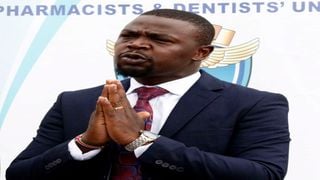
Kenya Medical Practitioners Pharmacists and Dentists Union (KMPDU) Secretary General Dr Davji Bhimji Atellah.
| File | Nation media GroupHealth
Premium
President Ruto’s promises in health sector remain unfulfilled
During his election campaign, President William Ruto promised to address the problems plaguing the health sector, including reducing the cost of healthcare, improving access and shortage of healthcare workers.
But experts reviewing President Ruto’s first year in office have noted a decline in several areas, with doctors in public hospitals threatening to go on strike in three months over unemployment, lack of essential drugs and slow infrastructure development.
In June last year, Dr Ruto told Kenyans that he would introduce a universal health insurance scheme that would ensure that every Kenyan has access to free healthcare. But one year down the line, this has not ben implemented.
According to the Kenya Demographic and Health Survey 2022, an estimated 95 per cent of Kenya’s poor men and women don't have health insurance, illustrating the scale of their financial pain when they fall ill. In June, Peter Mwashi Ndung’u, a labourer, lost his battle with cancer. This was after his family sold their property to pay for his treatment.
Even after his death, his family is still in debt.
President Ruto had also unveiled a plan to recruit 20,000 health workers within the first 100 days of being sworn in, but after a year in office, this has yet to happen.
Kenya Medical Practitioners Pharmacists Dentists Union secretary-general Devji Atellah said that 10 years ago, Kenya made a commitment at the first international forum on human resources for health that the country would employ health workers continuously until it reached the World Health Organization’s recommended ratio. But 10 years on, the union says the country is doing very badly on employment of health workers.
“We are worse off not only in terms of the number of health workers we employ each year, but also in terms of the number of health workers currently working in the sector. But what’s more worrying is not that nobody is employing health workers, it’s the deliberate removal of instruments that protect the rights of health workers to be employed, trained, remunerated well, deployed and socially protected,” Dr Atellah said.
To have their issues addressed and to petition the President on the state of health care in the country, doctors and nurses demonstrated at State House on Tuesday, highlighting the severe shortage of human resources and chronic shortage of essential drugs and other medical supplies in public hospitals.
“This demonstration serves as a collective call for urgent action to address the critical issues plaguing the health system, which directly affect the quality of care our patients receive,” Dr Atellah said.
He added: “What we have seen so far from this government is plans and not implementation and the only thing I support is the plan to implement the Chronic Disease Fund. We have had several cases of patients being detained in hospitals across the country. This will help Kenyans if it is implemented.”
He also questioned the capacity of many of the new hospitals being put up in the country, saying they lack drugs, reagents and equipment.
“People don’t need buildings, they need drugs, they need care. Where are the doctors to look after them? Why do they have to queue for eight hours to be seen?” he asked.
To ease the burden on the public health system, the President promised to invest heavily in primary health care and employ 100,000 community health promoters.
This did not go down well with county leaders, who said the national government was interfering with the devolved function and have since warned the national government to stop interfering and frustrating the sector.
Council of Governors (CoG) chairperson Anne Waiguru said in a statement that several areas, including the provision of primary health care services, deployment of community health workers (CHWs), attempted establishment of primary health care networks, creation of institutions and authorities within the sector, and proposed changes to legislation by the Ministry of Health, have severely compromised the implementation of the devolved health function.
Tharaka-Nithi Governor Muthomi Njuki, who chairs CoG’s health committee, said the national government should instead provide funding for CHWs as conditional grants to the devolved units.
“Why would you ask the same people who are funding the same activities at the county level to fund the same activities at the national level?” asked Mr Njuki.
To achieve universal health coverage, President Ruto’s administration has been keen to implement reforms in some of the key institutions in the sector, including the National Health Insurance Fund (NHIF) and the Kenya Medical Supplies Authority (Kemsa).
Cabinet has since approved to scrap NHIF and replace it with four separate funds through the Primary Health Care Bill, the Digital Health Bill, Facility Improvement Fund Bill and Social Health Insurance Bill.
And after the Kemsa scandal involving purchase of mosquito nets, the authority’s board and other officials were replaced.
However Dr Atellah remains unconvinced by the actions taken to clean up the two institutions.
“We want to see change in the health sector. It is time to move from talk to action,” he said.
TOMORROW: We assess the President’s hits and misses in security and debt management.





